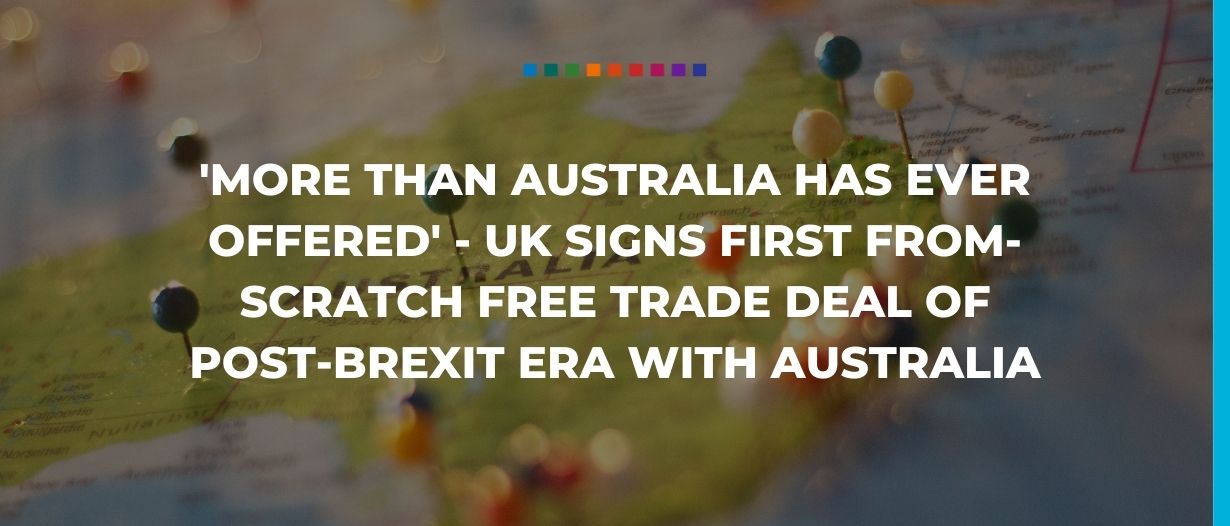The UK has signed its first from-scratch free trade agreement of the post-Brexit era with Australia, in a deal that British negotiators have said is the best Australia has ever offered.
Announced by the UK’s Department for International Trade (DIT) last night, the deal will set new standards in digital and services trade between the two countries, and will create new work and travel opportunities for both Brits and Australians.
After being agreed in principle in June by UK Prime Minister Boris Johnson and Australian Prime Minister Scott Morrison, negotiators have spent the past six months finalising all chapters of the agreement.
The final deal was signed in a virtual ceremony by the UK’s International Trade Secretary Anne-Marie Trevelyan last night, and will now be laid in parliament for a period of scrutiny.
Goodbye tariffs for UK exports
In 2020, trade between the UK and Australia was worth £14 billion in total, according to the DIT.
The new agreement is expected to unlock an additional £10.4 billion of trade between the two countries, and will eliminate all tariffs on UK exports to Australia.
In a press statement, the DIT said the deal is “tailored to the UK economy”, with agreements in sectors where Britain is a world leader, such as digital and tech.
The deal will also give UK firms guaranteed access to bid for an additional £10 billion worth of Australian public sector contracts per year.
Stephen Phipson, CEO of British manufacturers’ organisation Make UK, said that achieving a new preferential trade arrangement with Australia is welcome for Britain’s manufacturers.
“British manufacturers will benefit from day one with tariff-free access on goods sold, and will witness improvements in business mobility between the two countries,” said Phipson.
“With enhanced export opportunities for the UK’s medical device manufacturing sector and strengthened frameworks for bilateral co-operation on technical standards and regulations, there is much that the UK and Australia can work on in the future to boost exports from the UK.”
The UK has now signed a trade agreement with #Australia.
— Department for International Trade (@tradegovuk) December 17, 2021
This deal:
✅ cuts red tape for UK businesses
✅ makes it easier to travel and work in Australia
✅ supports UK jobs
Here are the top 10 benefits ????
Trade = growth = jobs
Dan McGrail, CEO of RenewableUK, a not-for-profit renewable energy trade association, said the agreement will make it easier for UK and Australian companies to export green technologies and expertise, speeding up the transition of both countries towards net zero.
“Australia has the potential to be a clean energy powerhouse, able to provide all its electricity needs using just 1% of its offshore wind potential,” he said.
“We look forward to seeing even more UK companies out in Australia, ensuring they maximise all the economic benefits we’ve seen flow from our low-cost wind energy and green hydrogen developments.”
Services trade access
The agreement will also give greater access to the Australian market for the UK’s service sector, which represents 80% of the British economy, according to data from IHS Markit.
This includes by expanding employment opportunities for UK service providers to live and work in Australia.
Young people from the UK will be allowed to work and travel in Australia for up to three years at a time, removing previous visa conditions.
And for the first time ever, UK service suppliers such as architects, scientists, researchers, lawyers, and accountants will have access to visas to work in Australia without being subject to Australia’s skilled occupation list.
As the DIT noted in its press statement: “This is more than Australia has ever offered any other country in a free trade agreement.”
BREAKING: The UK has just signed a free trade agreement with #Australia. ????????????????
— Department for International Trade (@tradegovuk) December 16, 2021
This deal will help boost trade between our two nations, worth £14bn in 2020.
Read more: https://t.co/aqZJpbCvrP pic.twitter.com/KQoRsCNphB
Nicola Watkinson, managing director for international trade and investment at TheCityUK, said the agreement provides further evidence that the UK is “breaking ground” through new trade deals with key trade partners.
“The agreement rightly focuses on issues important to the services sectors, such as recognition of professional qualifications, data and digital provisions, which all create new opportunities for UK exporters,” she said.
“As the UK’s largest exporter of services, the financial and related professional services industry welcomes this agreement.”
Expanding trade horizons
Finally, the UK also hopes that the deal will offer a gateway to the Indo-Pacific region for British trade, and will boost the UK’s bid to join the Comprehensive and Progressive Trans-Pacific Partnership (CPTPP).
The CPTPP is one of the largest free trade areas in the world, covering 11 Pacific nations with a combined GDP of £8.4 trillion.
Its current members are Australia, Brunei Darussalam, Canada, Chile, Japan, Malaysia, Mexico, Peru, New Zealand, Singapore, and Vietnam.























